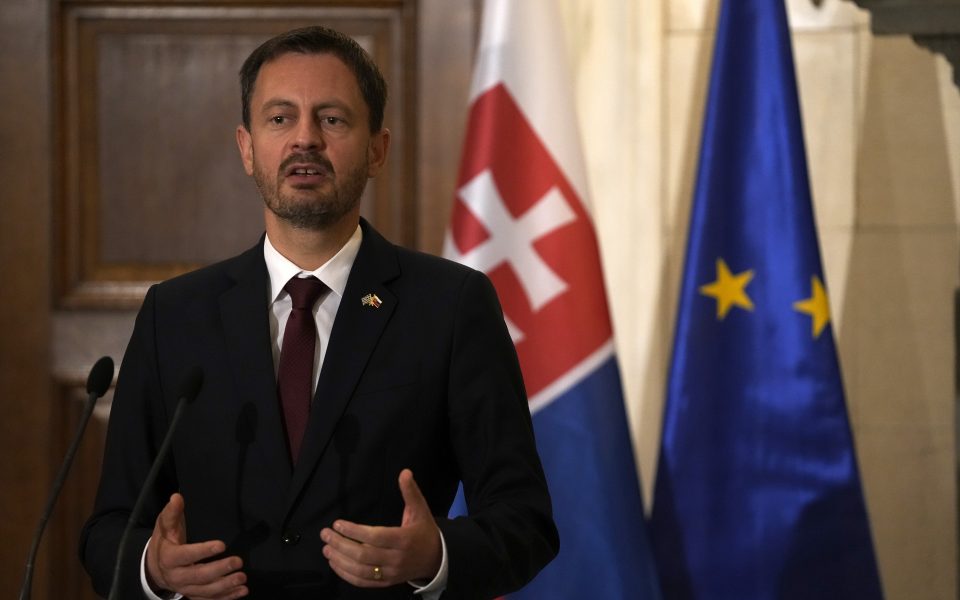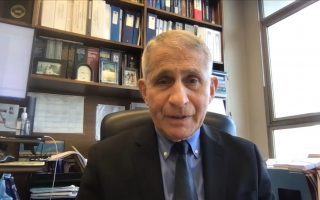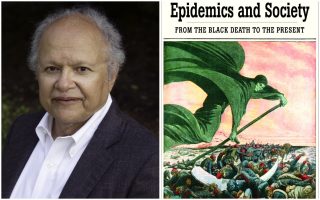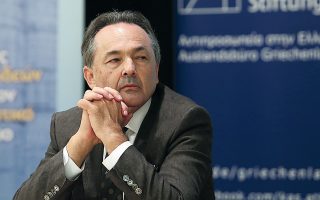Slovak PM reaffirms new chapter in relations
In interview ahead of meeting with Kyriakos Mitsotakis, Slovak Prime Minister says country backs Greece over Turkey’s East Med activities

Slovak Prime Minister Eduard Heger hails a “new chapter” in his country’s relationship with Greece. Heger met Thursday with Kyriakos Mitsotakis in Athens – the first such meeting between the leaders of the two countries in 10 years. In an exclusive interview with Kathimerini, he says Slovakia “stands and will stand fully by Greece and Cyprus in response to illegal drilling activities by Turkey in the Eastern Mediterranean.” On the migration issue, Heger emphasizes the need for “European solutions” and notes that “no one wants a repeat of 2015.” Referring to the upcoming discussions on the reform of the European Union’s fiscal rulebook, he highlights the continuing importance of sound public finances. Finally, Heger explains the reasons for the low rate of vaccination in Slovakia and why his government has not opted for mandatory vaccination policies.
Bilateral ties have gone through a difficult phase, punctuated by Greece’s financial crisis and the subsequent refugee crisis. Is your visit a sign of more promising days ahead? In which areas should we expect to see closer cooperation between the two countries?
Exactly! I believe it is time to give our relationship new dynamics after years when our ties had been put rather on hold at the highest political level and none of the recent governments cared. The last meeting of prime ministers dates back to 2011 on the sidelines of the European Council. Ten years later we are in a completely different context. Here I want to acknowledge difficult structural reforms that Greece has undergone over these years. The euro crisis perhaps caught us in Slovakia too soon after we joined the eurozone in 2009. For us, they were very new and difficult times politically. It is no secret the Slovak government fell apart in 2011 over a bailout program for Greece. Then the migration crisis came and the relationship suffered again.
A new approach was brought by Igor Matovic as prime minister, who made very clear that Slovakia stands and will stand fully by Greece and Cyprus in response to illegal drilling activities by Turkey in the Eastern Mediterranean. We will always be vocal on any breach of international law. I want to use this visit to reaffirm this new chapter. This is my first official visit outside the region and Brussels. I want to make sure we have partners also in the Mediterranean. Our relationship should be based on cooperation in areas relevant to both countries. If we wish to achieve climate neutrality, we must do that together and we must also find concrete ways to cooperate. In the summer we sent an unprecedented team of 75 firefighters with 30 vehicles to fight the severe fires in Greece. This is also leading us to wider cooperation on the climate agenda, where forests, although far from exclusively, will play an important role in achieving our objectives. In addition, I also see potential in looking for ways how to transform coal regions we both have in common. We can learn from each other and with each other. It is also important to work on new possibilities for tourism and to prepare for the post-pandemic period. Greece is the third most popular holiday destination of the Slovaks. There is still more we can do to create new business opportunities on both sides. I am looking forward to discussing these more in detail with Prime Minister Mitsotakis.
Slovakia recently signed a letter by eight finance ministers pushing back against the loosening of the Stability and Growth Pact. Can the recovery be sustained and the investments necessary for the green transition be made without a change in the rules – or in the way they are interpreted?
Unprecedented fiscal support has been rightly implemented to combat the Covid-19 crisis; however, its impact on our public finances cannot be ignored. In my view, it is important to continue to apply measures that support the economic recovery, for as long as necessary. In this regard, we must keep in mind fiscal sustainability over the long run. I would like to stress that the recovery should not be built at the expense of our future generations. Sound public finances remain one of the key pillars of EU membership and create additional space for policy priorities and upcoming challenges.
The effective and timely implementation of the recovery and resilience plans focusing on both reforms and investments is crucial for the future of Slovakia, as well as for other EU member-states, as they represent a major fiscal stimulus for our economies.
Regarding the future of EU fiscal policies, I acknowledge that the situation is still uncertain, but I think that there is the momentum to resume the discussions on SGP reform, which however shouldn’t be linked to the deactivation of the general escape clause (i.e. return to existing EU fiscal rules). The outcome of these deliberations should be a rules-based framework, which would be predictable, simplified and enforceable. This would allow for incentivizing pro-growth policies while at the same time safeguarding sustainability of public finances.
How concerned are you about the rise in energy prices? Is there a role for the EU in cushioning the blow for consumers? Do you think this further complicates the path toward agreement on Fit for 55?
Slovakia was the first one in our region to subscribe to the climate neutrality objective by 2050. Not just at the European but also the national level. We see this as an opportunity to safeguard our planet for future generations. Decarbonization and the green recovery is a big part of our recovery plan. At the same time, from the very beginning of discussions on the new Fit for 55 package, with higher climate ambitions by 2030, I have been vocal on the possible social impacts on the most vulnerable – households and small consumers. Slovakia is among the countries with the highest risk of energy poverty, where one-fifth of low-income households spend 25% on energy bills. We must be careful not to lose the support of our citizens for the green transition. The current situation gives us a taste of how unpredictable the energy market can be. There are multiple reasons behind it, but the main one is the dramatic increase in the prices of fossil fuels. This time, unlike during the gas crisis in 2009, it is a situation that is affecting all European countries, so yes, I see a role for the EU. We have to find the right mix of solutions both at the national and the European level. And we have to do it quickly.
Vaccination
Why are the vaccination rates stuck at such low levels in Slovakia? What are you doing to increase them?
Slovakia is one of the EU member-states with the lowest proportion of people vaccinated against Covid-19. Despite the enormous efforts of the government, only about 42% of people have been vaccinated with the second dose. There is a strong anti-vax movement in Slovakia, whose strong players are members of the opposition and several doctors. The rapid onset of the third wave shows that the most vulnerable are those who are not vaccinated. It is possible that the devastating consequences of the third wave might increase the population’s interest in vaccination. Society is strongly polarized on vaccination, which is why the government is not considering mandatory vaccinations.
You became prime minister on the back of the controversy over Sputnik V. Was it a mistake to approve its use without it being sanctioned by the European Medicines Agency? Have vaccinations with Sputnik now stopped?
One always has to look at the specific context in which decisions have been made. The situation in the country was very dramatic with a very high number of deaths every day. Under these circumstances, one thinks of any solution, even an emergency one, to stop it. At the end of the day around 8,000 people chose to be vaccinated with Sputnik V. It was their own choice. I would end by saying we learnt our lesson. This topic is now over and, thanks to the EU joint procurement, we should have enough EMA-registered vaccines for the years to come. If necessary.
Your party was essentially elected on an anti-corruption platform. How hard has it been, in practice, to root it out, to break the networks of collusion between politics, business and organized crime?
The elections in 2020 and the emergence of a center-right coalition were also groundbreaking in terms of the fight against corruption. Corruption under Robert Fico controlled the police, the prosecutor’s office and the judiciary. A group of untouchable, privileged people was formed. After the 2020 elections, the new government stopped interfering in the work of law enforcement agencies. And the results came. About 26 high-ranking officials from the former regime pleaded guilty. Among them are the top police, secret service, financial administration and judiciary officials. The special prosecutor, who was supposed to fight corruption, was sentenced to 14 years for corruption. The opposition, made up of representatives of the former government, questions the objectivity of the investigation and seeks to weaken the cohesion of the government through various activities.
I am glad we got strong support last week for our efforts from the monitoring group on the rule of law from the European Parliament visiting Bratislava. Protecting democracy and the rule of law is not an easy task. The same goes for journalists to make them feel safe and protected. It is not always the case, even in the most developed countries. Several member-states, including Greece, have their own experience of this. We have our own trauma caused by the murder of investigative journalist Jan Kuciak and his fiancee back in 2018. I welcome a new initiative on the protection of journalists in the EU outlined by the Commission’s President Ursula von Der Leyen during her State of the Union speech. I very much hope our country will play an active role in this process also at the EU level.
Migration
Do you see any prospect of an EU-wide agreement on the new Migration Pact? How do you respond to the claims of countries like Greece and the rest of the MED5 that there cannot be a workable common policy without greater solidarity from non-frontline states?
The only way is to look for solutions together. Frontline member-states have their own legitimate interests and expectations. And we have ours. But no one wants a repeat of 2015. This is already a good starting point for discussions. The ultimate goal for all of us must be to find European solutions. There is no way we can handle this at the national level. We will be constructive and support solidarity as the main principle, going hand in hand with responsibility. We are ready to look for ways how to provide assistance on the ground for countries like Greece, which are on the frontline. I am glad that the government was able to agree quickly on a project in the health sector to help in migrant centers in Greece, side by side with Austria.





